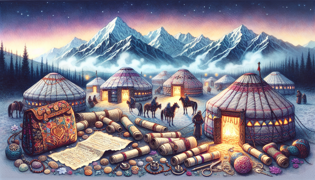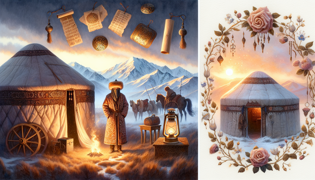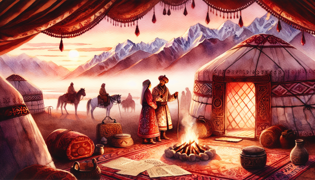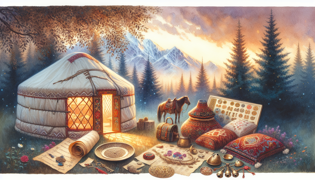Khan's Riddles: A Kyrgyz Saga of Love and Wit
Reading Time: 9 min

About Story: Khan's Riddles is a from kyrgyzstan set in the . This tale explores themes of and is suitable for . It offers insights. A tale about choosing a partner through riddles.
Introduction
High in the cradling arms of the Tian Shan ranges, the camp of Kyrchy lay swathed in pre-dawn mist. Lanterns flickered like fireflies trapped in glass, casting amber pools upon the cold earth. A hush draped over the felt yurts while the dew-laden grass carried the faint tang of mutton stew simmering in distant cauldrons. When sunrise broke, it revealed the Khan’s figure perched atop a carved dais with an eagle’s beak upon his helm. His gaze was a blade tempered by years, his challenge sharper than mountain air. Each maiden’s heart fluttered like autumn leaves under the Khan’s glinting stare. One by one, suitors stepped forward, their spirits thrumming a wild percussion beneath layered garments. Whispers of the ancient rite—altyn beshik—passed from lip to eager ear. No blade could cut their fate; no horse could bear their win if they failed the Khan’s brain-forging trials. A breeze stirred the woollen tapestries, revealing the earthy bouquet of sheepskin and toasted barley. Among the hopeful stood Aibek, known for wit keener than eagle claws. His brow creased in thought as though wrestling the dawn itself. Across the ring, he glimpsed Gulnara, her laughter as bright as a silver brook. She bore an embroidered sachel of cerulean and gold, each stitch echoing clan tales. The Khan’s voice rang out, low and rolling like distant thunder. “Solve my riddles, lads and lasses,” he boomed, “and prove worth beyond steel and sinew.” Around them, strings of wind-chimes tinkled in the crisp air—soft bells heralding fate’s approach. Hearts quickened, and sweat beaded on foreheads polished by hope and fear. None could foresee which question would shatter the boldest spirit. Yet all would learn that true union was tested in riddles of wit, soul, and fire.
The First Riddle: Whisper of the Winds
As the first ray of sun touched the high steppe, the Khan rose and unfurled a parchment like a pale promise. His voice echoed across the plain: “What speaks without a tongue, travels vast but never walks, and holds secrets in its breath?” Suitors murmured, brows furrowed. The stallion-hoofs of distant herds drummed like impatient drums. Aibek closed his eyes and listened to the breeze, the hiss of grass underfoot, and the quiet rustle of felt as he shifted his weight. He remembered how the winds whispered across his childhood fields, carrying his mother’s lullabies. Words danced like moths around the flickering torch. “It is the wind itself,” he declared, voice steady as carved wood. The Khan’s lips twitched in approval. As Aibek bowed, a faint aroma of wild tulip petals drifted from the valley below.
Meanwhile, Gulnara awaited her moment beside the dais. The Khan’s gaze fell upon her as he pronounced the next challenge: “What can be broken yet never held, given yet never owned?” The camp held its breath; the crackle of distant campfire logs punctuated the quiet. Gulnara recalled a line of her grandmother’s songs – promises made beneath the velvet night. Heart thudding, she answered: “A promise.” The Khan dipped his head, the crowd exhaling in relief and wonder. That evening, the air grew cool, and the smell of roasted lamb curled on the breeze like a contented sigh. Under the canvas of flickering stars, the young pair exchanged glances, as though riddles might spark love as readily as lantern-light warms frost. They realised that trust, like wind, spoke though silent, and promises soared on wings of hope.
In those hushed hours, the camp was alive with murmured intrigues. A ragged minstrel played a reed flute whose lonely notes wept beneath the night sky. Felt rugs held the remnants of spilled tea, their fibres fragrant with cardamom. Lanterns glowed like captive suns, casting long shadows that danced upon yurt walls. The Khan observed in silence, his eyes reflecting the dancing flames. And though the first two riddles had been conquered, the air crackled with the knowledge that greater trials awaited at dawn.

The Second Riddle: Flames in the Hearth
The following dawn arrived on the wings of crows cawing atop oiled yurt poles. The Khan, seated by a roaring hearth, held aloft a rune-carved staff. Ash drifted like weary moths from the embers. “What devours all things under the sun, yet needs a breath to live?” The suitors glanced at one another. Flickers of torchlight played on anxious faces. Gulnara ran her fingers along the felt wall, feeling the soft weave beneath her fingertips. She remembered how fire had warmed her childhood nights, also how it could reduce a home to embers. With heart aflame, she answered: “Fire.” The Khan’s gravelly laugh rolled across the yurt: a rumble like distant thunder. “You see straight,” he declared, and a curved smile broke his stern façade.
Next it was Aibek’s turn. The hearth’s glow painted his features in warm rose and shadow. The Khan leaned forward, voice low as a mountain stream: “What steals warmth from the heart but leaves the mind frozen solid?” Aibek inhaled the scent of pine smoke and spiced broth simmering beyond the yurt. He sensed the crackle of coals beneath his boots as though they murmured hints. Finally, he spoke: “Fear.” The Khan’s nod was slow, weighty as an eagle’s descent. Outside, a soft wind carried the faint jingle of harnessed horses. The felt floor beneath Aibek’s knees held the lingering warmth of shared triumphs.
By nightfall, the courtyard crackled with hushed excitement. Lanterns swayed on ropes, their shadows dancing over packed earth. A distant shepherd’s song drifted through the chill, mingling with the smoky aroma of braised mutton. Straw mats creaked as elders leaned forward. Gulnara and Aibek exchanged a glance, eyes bright with new understanding: that courage and fear were but two sides of the same blade. In that moment, they felt bound not by riddles alone, but by the shared fire of their souls igniting across the hearth’s glow.

The Third Riddle: Heart’s Mirror
On the third morn, a slender moon lingered in the pale blue sky as the Khan unveiled a polished bronze mirror. “One last test,” he intoned. “Peer into this glass to find the truth you hide, yet only the pure of heart can bear its honest gaze. Tell me what you see.” A hush blanketed the ring. Gulnara stepped forward first. The metallic scent of bronze drifted upward as she drew close. In the mirror’s shine she glimpsed her own eyes—bright, steady, unflinching—yet shadowed by a flicker of doubt. She tasted the sharp tang of mountain air and remembered nights spent wandering beneath the stars in solitary wonder. “I see my soul laid bare,” she whispered, voice trembling like a reed in wind. “And though fear makes its mark, it is tempered by love.” The Khan inclined his head, the sun glinting off his helm like a crown of light.
Aibek approached with a steadier gait than he felt within. The mirror’s cool surface reflected his features twice: one proud, the other uncertain. He felt the rough wool of his sleeve beneath his palm—and recalled his vow to protect Gulnara through storm and song. When he spoke, his voice was low and sure: “I see the man I strive to be, and the flaws I must overcome.” A single tear glimmered on his cheek before a passing breeze whisked it away. A distant horse whinnied, and the slosh of water in a nearby trough punctuated the stillness. Then the Khan rose and stretched his arms wide, as though lifting an unseen veil from over the world. “Well met,” he declared, “for in honesty rests the deepest bond.”
The onlookers stilled their breaths; a mother tucked her shawl closer, the wool’s fibres soft against her skin. Smoke from a smouldering brazier curled toward the felt roof, carrying the aroma of pine resin and softened leather. Gulnara and Aibek met each other’s eyes and, without words, understood that no riddle could rival the power of shared truth. The mirror had revealed more than faces; it had unveiled their intertwined destinies. The steppe held its silence, as though paying homage to a promise sealed in reflected light.

Conclusion
When the sun reached its midday zenith, the Khan stood between Aibek and Gulnara. In his weathered hand he held a single rose petal dipped in saffron. The camp was silent but for the distant song of a shepherd’s flute and the murmured prayers of onlookers. “You have answered wind, fire, fear, and truth,” he proclaimed, voice deep as canyon echoes. “But the greatest riddle is this: will you share the burdens of heart and hearth, as one?” Aibek offered his hand first, fingers brushing the petal’s velvet softness. Gulnara smiled, eyes shining like morning dew on mountain grass. “We will,” she declared, “for love itself asks no impossible task.” A breeze stirred the canvas above as if carrying their words into eternity. The Khan bowed, and behind him the yurts seemed to stand taller, their felt roofs glinting in celebration. That evening, stories of their union spread across the steppe like rippling water, weaving into every campfire song.
In days to come, Aibek and Gulnara ruled beside the Khan with laughter in their halls and riddles by the hearth. Travellers spoke of the lovers whose vows were sealed in wisdom, whose bond was forged by challenges of mind and soul. And though the years brought new trials, they faced each one together, recalling that first wind’s whisper, the hearth’s fierce glow, and the mirror’s honest gaze. In time, their tale became a lantern in the night for all who sought love tempered by truth. And thus, among the snow-capped peaks and endless grass, the legacy of Khan’s Riddles endured—golden as altyn beshik cradles, steadfast as the mountain’s stone.

















